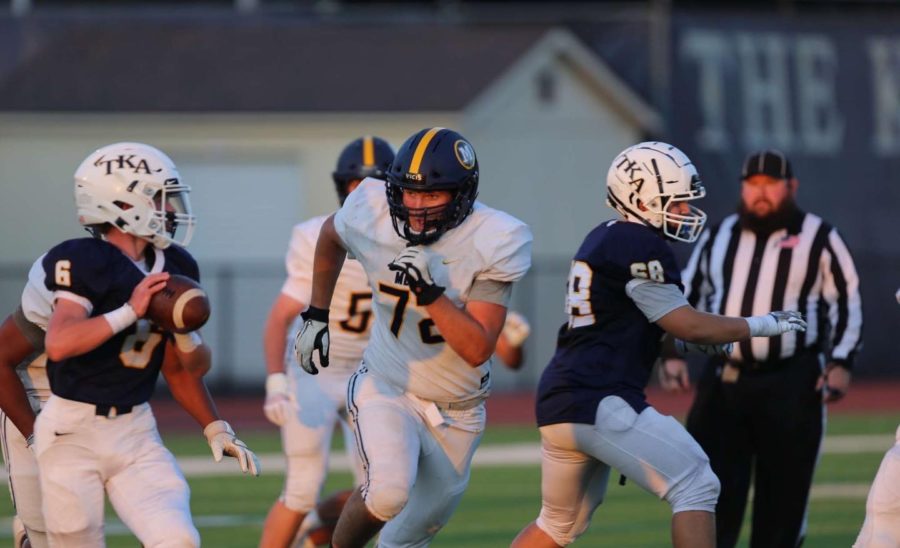Thank You, Football
Senior Noah Kornfeld plays in a Menlo varsity football game against King’s Academy on Friday, Sept. 3. Photo courtesy of Eli Housenbold.
October 10, 2021
On Saturday, Sept. 18, I suffered an injury during the Menlo varsity football game. It wasn’t an unbelievably big hit that knocked me out; you can’t even see it happen on the game’s film. I was simply pushed the wrong way, and I suffered a torn ACL and meniscus. This means surgery and six to nine months in recovery. It also means the end of my senior season. With the college recruiting process in full swing, a season-ending injury like mine is devastating for a possible college football career.
Not only will this injury end my high school football career, but basketball and ski season are also off the table for me.
One question I have thought a lot about since my injury is: do I regret playing? Could I have avoided the injury? If I had not been playing football, I wouldn’t be injured, right? However, I can say with absolute certainty that what I have gained from nearly four years of high school football is worth my injury and most other injuries I could have sustained. I would be nowhere near the athlete, friend or overall person that I am today without my football experiences.
As a small, wide-eyed freshman, I did not understand what it took to be a part of a successful football team. While I loved basketball and baseball, football demands another level of discipline. If you don’t know the play, the whole team runs. If you cause a penalty, the whole team runs. If you mess up and curse, the whole team runs. The discipline I learned during practice translated to other areas of my life. Sitting down to study for extended periods of time became easier because I was disciplined enough to put away distractions. In this sense, playing football yielded unforeseen rewards in my academic life.
Through football, I have also developed a unique skill I like to call the “ability to figure it out.” When in a game or practice, there is never a moment where everything is perfect, or where everything goes exactly as planned. The opponent is constantly scheming ways to confuse you, injuries can loom in the back of your mind or suddenly you’re just immersed in an extremely high-pressure situation. But whatever happens, to succeed in football, you must learn to figure out a way to get the job done. For me, it often looked like playing through small injuries. During my sophomore year, I broke my finger and had to play with a cast. But before each game and practice, I wrapped it in extra padding because that is what the game required of me. In life, there will be always problems and unexpected bumps in the road that I can navigate with more ease and confidence because of football.
Football is unlike any other sport because of the camaraderie it builds between teammates. In football, there are constantly moving parts. For every play, each lineman has to block so the quarterback can throw accurately to the wide receivers, who need to do their part by getting open for a pass. Unlike other sports, there isn’t really a star player. This means that each player needs every other player to succeed, creating a unique bond between teammatess. Because our success requires a group effort, we have to care for each other. We have to play as one unit instead of 11 individual players. Teamwork is a huge reason why anything works. Football, more than other sports, requires a high level of teamwork, and learning that skill has allowed me to perform optimally in collaborative environments.
Finally, football has both physical and mental elements, meaning it demands excellence in both. In many other areas of my life, I have had to exert myself either physically or mentally, but not both to a high level. In rigorous classes, I am working extremely hard mentally, but not so much physically. In other physical activities, like basketball, weight-lifting or conditioning, I am physically pushing myself, but I can get away with slacking mentally. When playing football games, or even practicing, I need to be both mentally sharp and physically prepared. The physical part seems intuitive. Strong, faster and quicker players are able to perform better in any sport — football is no exception. Personally, as a lineman, if I do not understand the plays or know my responsibility, my strength becomes irrelevant. Football is one of the few activities in my life that has provided an opportunity to strengthen me physically and mentally at the same time.
I get that football is a dangerous sport. Just this year, Menlo football players have suffered six season-ending injuries through just the first half of the season. Additionally, the unknown threats of severe, long-term head trauma are still ominously present. But the benefits are simply too great to use injuries as an excuse not to participate. Football has made me more focused, instilled a strong sense of camaraderie within me, allowed me to be a better problem solver, built up a tenacious work ethic and developed my physical and mental attributes more than any other experience. Throughout the next six to nine months, I will go through intense surgery and physical therapy just to get back to where I was pre-injury. My senior seasons will have passed me by because of one random play. Most people would face this experience with anger, sadness or even regret. But what football took from me during that fateful play is nothing compared to what it has given me. The lessons from football have become invaluable, and I don’t regret playing for a second.


